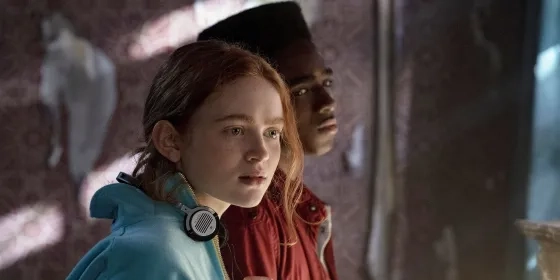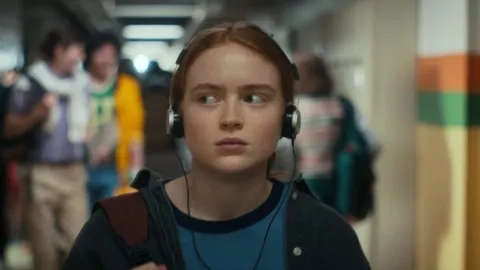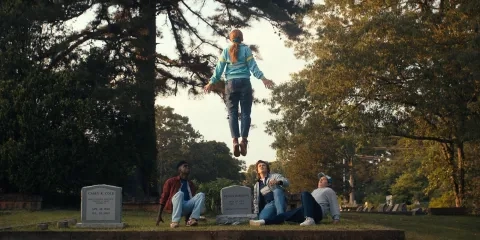What 'Stranger Things' Gets Right About Music Therapy
SFCM instructor, soprano, and scientist Dr. Indre Viskontas breaks down music therapy and its integral role in the fictional world of “Stranger Things.”
By Mark Taylor
“Music reaches parts of the brain words can't.” That line, exclaimed during a pivotal new episode of Netflix’s Stranger Things may be used to further the plot of the imagined storyline, but it turns out it's based very much in reality.
The final episodes of Season 4 of the hit Netflix show dropped July 1 and set streaming records, with more than 300 million hours viewed in just three days. In total, the show's fourth season—which features a set of children and adults fighting a mind-controlling monster called Vecna—has drawn critical acclaim and has made Stranger Things the most-watched English-language series on Netflix. (Surpassing Bridgerton, which as the SFCM newsroom explored, brought classical music to the masses earlier this year.)
But it’s not just the storyline that’s getting fans excited, it's the music. The series launched pop singer Kate Bush’s 1985 hit song, “Running Up That Hill” back up to the top of the charts (so much it’s now back into radio airplay.) The 37-year-old song is used during an emotional scene in which a young character, Max, must escape Vecna, who has trapped her inside her own mind, and the other characters deduce that her favorite song can be her “lifeline” to safety.
But how accurate is this? Can a song save a life? “I find it helpful to think about music as a kind of Swiss-army knife, a multi-purpose tool that has many different uses,” said Dr. Indre Viskontas. Viskontas is an opera singer and SFCM professor who earned her Ph.D. in cognitive neuroscience from UCLA, as well as graduating from SFCM with an M.M. degree in vocal performance in 2008.
While music therapy is still being studied, according to Viskontas, it has seen success. “Some interventions have been more rigorously studied than others, but when it comes to mental health, music therapy seems to be particularly effective in three areas: depression, anxiety and pain management,” Viskontas continued. “Music can remind people of who they are, of who they love, of their past. So sharing a musical experience can help them feel connected again to the present”—which is how the characters of Stranger Things successfully use the song.
Part of the huge new success of Kate Bush’s "Running Up That Hill" can also be explained through the link between music, emotion, and memory, “Music is a great mnemonic because it tugs at our heartstrings. When we feel strong emotions, we tend to build stronger memories for whatever triggered them,” Viskontas said. For Stranger Things fans, watching the beloved character, Max, quite literally running for her life during Bush’s song has created a new emotional connection and memory. “Many of our key milestones in life, graduations, final concerts, weddings, funerals, have a soundtrack,” Visktonas said. Music therapy is also used by doctors today as a treatment for the improvement of cognitive function in people with dementia.
From emotional connection to memory the uses of music don’t stop there. Vistkontas also wrote a book called, How Music Can Make You Better, and compiled a special white paper hailed by soprano Renée Fleming as “one of the best laid-out cases” on the crucial and positive effects on children involved in music, called Music For Every Child. For adults, it becomes more complicated: “Our adult brains are shaped by our experiences, we don't turn over neurons like we do skin cells. We keep most of them for life,” she continued. “Some people's experiences have trained their brains to respond to music passionately, they find it very rewarding. But for others, well, it's nice and all but not quite as impactful.”
That’s why, for the fictional character of Max on Stranger Things, her emotional connection to Kate Bush’s song was able to save her from Vecna. While for others it may be a different song, in our realm of reality the idea of music as a lifeline is very much a true tale.
While this season of Stranger Things' recurring tune works as a love letter to the sounds of the 1980s, the series is not without its own nods to classical music. In one of the early episodes, the show's music supervisor takes us back to 1880s Italian opera. A Verdi duet, followed by a Puccini aria rings through the room during one suspicious scene. In another episode, Bach’s Minuet in D minor rather eerily calms patients at an asylum.
As for Viskontas, the song that might save her from Vecna’s evil clutches? She has a few top contenders: “‘Jump in the River’ by Sinead O'Connor pretty much anytime, as well as ‘This Too Shall Pass' by OkGo,” she said.
Learn more about studying at SFCM.


